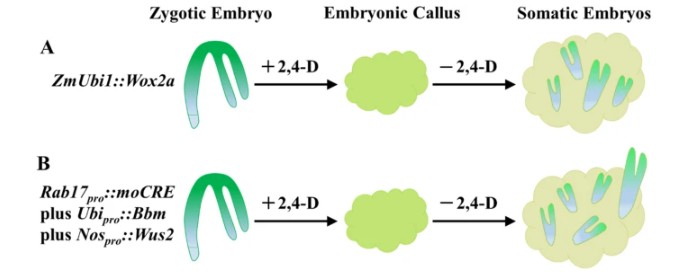The functional analysis of plant genes and their genetic improvement relies heavily on genetic transformation. Maize (Zea mays), along with other important crops such as rice, wheat, and barley, is an important cereal crop in global agriculture for food, feed, and biofuels. Conventional transformation of Zea mays has become a fundamental approach to Zea mays genetics research. Transgenic and editing-based studies have been used to identify and validate candidate genes to improve a variety of traits such as yield, plant stature, salt tolerance, and grain composition. Unfortunately, as with these crops, only a limited amount of Zea mays germplasm is available for conventional transformation. It relies extensively on laborious, time-consuming, and difficult tissue culture processes, thus significantly limiting the exploration of gene function and its potential for genetic improvement. Approaches that reduce complexity and increase genotypic flexibility have the potential to bring significant benefits to agricultural and Zea mays functional genomics research and crop improvement. The Zea mays gene Wuschel-like homologous frameshift protein 2a (Wox2a) has been shown to play a crucial role in promoting Zea mays embryonic cell formation and improving the efficiency of genetic transformation.
 Fig. 1. The frequency and intensity of Wox2a or Wus2/Bbm vector-induced somatic embryogenesis. (Liu et al., 2023)
Fig. 1. The frequency and intensity of Wox2a or Wus2/Bbm vector-induced somatic embryogenesis. (Liu et al., 2023)
As a leading provider of plant biotechnology, Lifeasible offers optimized Zea mays transformation solutions based on Wox2a for transforming recalcitrant Zea mays genotypes. Wox2a induces somatic embryo formation and promotes the growth of fragile, embryogenic, and regenerative healing tissues in the recalcitrant Zea mays genotype, B73. Wox2a is also capable of enabling phenotypically normal plants and their progeny to be regenerated. Our experts are committed to integrating these traits into Zea mays genetic breeding programs to accelerate the development of superior lines with traits tailored to yield performance under region-specific conditions.
The specific process of Wox2a-based Zea mays genetic transformation is as follows:
(1) Using the A188 genotype and B73 genotype Zea mays as parental materials, a series of Zea mays lines were obtained through crosses and screened for the Wox2a gene by gene location and expression pattern.
(2) Vectors for Wox2a gene expression driven by a constitutive promoter were constructed, and Zea mays genetic transformation experiments were performed.
(3) Regeneration of transgenic plants.
(4) Analyzing the phenotypes of B73 regenerated plants obtained by expressing Wox2a.
By regenerating somatic embryos derived from explants transformed with Wox2a-overexpressing vectors, Lifeasible can help you obtain T0 plants. These regenerated plants exhibit a normal phenotype and show full fertility. Our solution significantly improves Zea mays genetic transformation efficiency. If you are interested in our solutions, please contact us for technical consultation and quotation.
Reference
Lifeasible has established a one-stop service platform for plants. In addition to obtaining customized solutions for plant genetic engineering, customers can also conduct follow-up analysis and research on plants through our analysis platform. The analytical services we provide include but are not limited to the following:
July 13, 2024